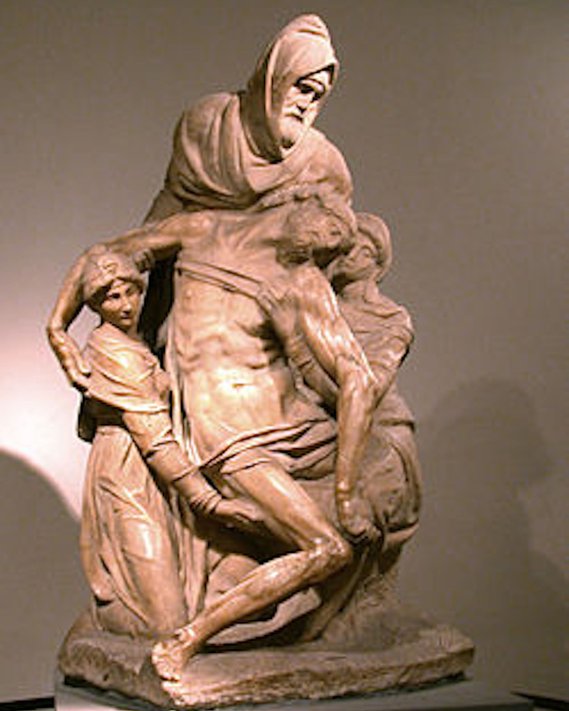A Pharisee’s Question
“Does our law condemn a man before it first hears him and finds out what he is doing?”
With these words, Nicodemus, one of the Pharisees, helped restore some sense of sanity to a heated exchange between the guards who returned empty-handed and the Pharisees who had sent them out to arrest Jesus and bring him in. So, who is Nicodemus and why would he speak up in Jesus’ defense?
Nicodemus shows up just 3 times in the Bible, all in the Gospel of John.
A Pharisee’s Question
by Steve Leininger
http://www.usccb.org/bible/readings/032820.cfm
Jeremiah 11:18-20
John 7:40-53
“Does our law condemn a man before it first hears him and finds out what he is doing?”
With these words, Nicodemus, one of the Pharisees, helped restore some sense of sanity to a heated exchange between the guards who returned empty-handed and the Pharisees who had sent them out to arrest Jesus and bring him in. So, who is Nicodemus and why would he speak up in Jesus’ defense?
Nicodemus shows up just 3 times in the Bible, all in the Gospel of John.
In John 3, the chapter begins:
Now there was a Pharisee named Nicodemus, a ruler of the Jews. He came to Jesus at night and said to him, “Rabbi, we know that you are a teacher who has come from God, for no one can do these signs that you are doing unless God is with him.” [John 3:1-2]
As a “ruler of the Jews”, Nicodemus was most likely a member of the Sanhedrin. The Sanhedrin was the Jewish council, made up of seventy-one members of elders, chief priests, and scribes and presided over by the high priest. It exercised authority over the Jews in religious matters.
Jesus was in the early days of his public ministry, and notable events that have already happened include the baptism of Jesus by John the Baptist, the miracles at the wedding in Cana, and the cleansing of the temple, where Jesus drove the vendors of sacrificial animals and money changers from the temple. He had not yet drawn the full animosity of the Pharisees, but he must have been on their radar. Nicodemus came to Jesus “at night” which may suggest that he was being a bit secretive about his meeting.
Then follows a conversation with Nicodemus about the meaning of being "born again" or "born from above” and mention of seeing the "kingdom of God". Nicodemus explores the notion of being literally born again from one's mother's womb, but most theologians recognize that Nicodemus knew Jesus was not speaking of literal rebirth, but was posing the impossible meaning of the words in order to exclude it, and to draw forth the true meaning. Jesus expresses surprise, perhaps ironically, that "a teacher of Israel" does not understand the concept of spiritual rebirth.
At this point, the conversation with Nicodemus becomes more of a monolog. Jesus declares the source of this new life by describing himself as the example of one who “came down from heaven,” whom God sent because He “so loved the world, that He gave his only begotten Son, that whosoever believeth in Him should not perish, but have everlasting life” [John 3:13, 16].
Today’s gospel reading takes place in Jerusalem, sometime between late September and late October, about a half a year before the crucifixion and resurrection of Jesus. We know this because earlier in John 7, we are told that the Jewish feast of Tabernacles was near. During the existence of the Jerusalem Temple, the Feast of Tabernacles was one of the Three Pilgrimage Festivals on which the Israelites were commanded to perform a pilgrimage to the Temple.
Jesus had been traveling about Galilee because it was safer than Judea, where the Jews were trying to kill him. Despite encouragement from his “brothers,” Jesus declines to travel to Judea, so that his disciples in Jerusalem could “see the works that he is doing.” They head on to the festival without him.
By verse 14, with the 7-day festival half over, Jesus, having traveled secretly to Jerusalem, appears at the temple to teach. While he is teaching, the crowd is becoming more convinced that Jesus just might be the Messiah.
The Pharisees heard the crowd murmuring about him to this effect, and the chief priests and the Pharisees sent guards to arrest him. [John 7:32]
On the last and greatest day of the feast, we find the crowd divided in their opinion of Jesus.
Some in the crowd who heard these words said, “This is truly the Prophet.”
Others said, “This is the Messiah.” But others said, “The Messiah will not come from Galilee, will he?
Does not scripture say that the Messiah will be of David’s family and come from Bethlehem, the village where David lived?”
[John 7:40-42]
The guards return empty handed. The Pharisees didn’t seem to be amused by this. They asked the guards why they failed at their assigned duties.
The guards answered, “Never before has anyone spoken like this one.”
So the Pharisees answered them, “Have you also been deceived?
Have any of the authorities or the Pharisees believed in him?
But this crowd, which does not know the law, is accursed.”
[John 7:46-49]
It is at this very moment that one of the Pharisees who must have believed in Jesus speaks up. It is Nicodemus.
“Does our law condemn a person before it first hears him and finds out what he is doing?”
[John 7:51]
This clearly angers his fellow Pharisees, who derisively ask Nicodemus if he’s from Galilee too. But they went home, taking no further action at that time. Nicodemus, a follower of Jesus in his heart, has defused the situation – for the time being.
The last time we hear about Nicodemus is after the crucifixion of Jesus in John Chapter 19. Jesus has been found by the soldiers to be already dead. His legs were not broken, but his side was pierced, from which flowed blood and water.
After this, Joseph of Arimathea, secretly a disciple of Jesus for fear of the Jews, asked Pilate if he could remove the body of Jesus. And Pilate permitted it. So he came and took his body.
Nicodemus, the one who had first come to him at night, also came bringing a mixture of myrrh and aloes weighing about one hundred pounds.
They took the body of Jesus and bound it with burial cloths along with the spices, according to the Jewish burial custom.
Now in the place where he had been crucified there was a garden, and in the garden a new tomb, in which no one had yet been buried.
So they laid Jesus there because of the Jewish preparation day; for the tomb was close by.
[John 19:38-42]
It seems that both Nicodemus and Joseph of Arimathea were Pharisees and “secret disciples of Jesus.” Both Nicodemus and Joseph of Arimathea were sainted and are the patron saints of funeral directors and pallbearers. Were they alone among the Pharisees in this hidden following, in believing in the good news that Jesus preached? Probably not, but much of those kinds of details are lost in history.
What we do know is that Nicodemus, a Pharisee, met with Jesus early in his ministry and was given a personal disclosure on what was to come. Later, Nicodemus took the potentially risky position of reminding his fellow Pharisees that they must first give Jesus a fair hearing before passing judgement on him. And on the day of Jesus’ crucifixion, Nicodemus was there to help with the preparation and burial.

